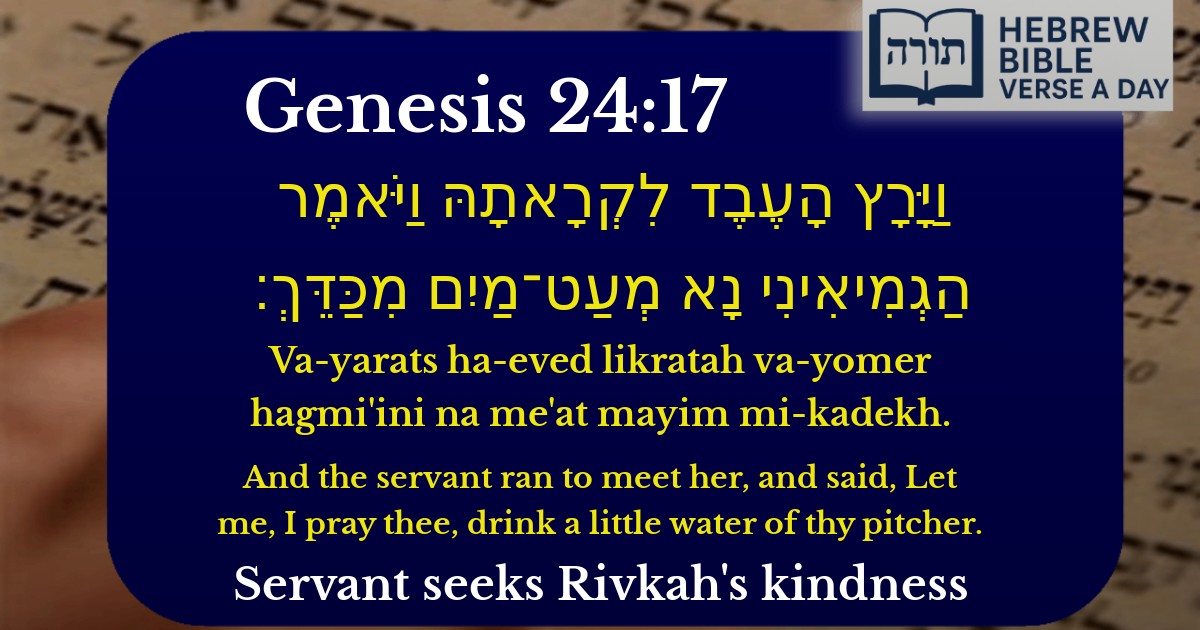Join Our Newsletter To Be Informed When New Videos Are Posted
Join the thousands of fellow Studends who rely on our videos to learn how to read the bible in Hebrew for free!
Hebrew Text
וַיָּרָץ הָעֶבֶד לִקְרָאתָהּ וַיֹּאמֶר הַגְמִיאִינִי נָא מְעַט־מַיִם מִכַּדֵּךְ׃
English Translation
And the servant ran to meet her, and said, Let me, I pray thee, drink a little water of thy pitcher.
Transliteration
Va-yarats ha-eved likratah va-yomer hagmi'ini na me'at mayim mi-kadekh.
Hebrew Leining Text
וַיָּ֥רׇץ הָעֶ֖בֶד לִקְרָאתָ֑הּ וַיֹּ֕אמֶר הַגְמִיאִ֥ינִי נָ֛א מְעַט־מַ֖יִם מִכַּדֵּֽךְ׃
וַיָּ֥רׇץ הָעֶ֖בֶד לִקְרָאתָ֑הּ וַיֹּ֕אמֶר הַגְמִיאִ֥ינִי נָ֛א מְעַט־מַ֖יִם מִכַּדֵּֽךְ׃
🎵 Listen to leining
Parasha Commentary
📚 Talmud Citations
This verse is quoted in the Talmud.
📖 Chullin 95b
The verse is referenced in a discussion about the behavior of Eliezer, Abraham's servant, and his interaction with Rebecca, illustrating proper conduct and divine providence.


Context of the Verse
This verse (Bereshit 24:17) describes the encounter between Avraham's servant (traditionally identified as Eliezer) and Rivka at the well. The servant had been sent to find a suitable wife for Yitzchak, and this moment marks the beginning of the test to identify the right candidate.
Eliezer's Approach
Rashi notes that the servant "ran to meet her" because he saw the water rising toward her—a miraculous sign indicating her righteousness (Rashi on Bereshit 24:17). The Midrash (Bereshit Rabbah 60:5) elaborates that Rivka's exceptional kindness was evident even before she drew water, prompting Eliezer to approach her immediately.
The Request for Water
Eliezer's phrasing—"Let me, I pray thee, drink a little water of thy pitcher"—is significant. The Ramban (Bereshit 24:17) explains that he intentionally made a modest request to test whether she would offer more than asked, demonstrating the trait of chesed (lovingkindness) that Avraham sought in a wife for Yitzchak.
Rivka's Response and Its Deeper Meaning
Symbolism of the Pitcher
The Malbim (Bereshit 24:17) observes that the word "כַּדֵּךְ" (thy pitcher) emphasizes personal effort—Rivka had to lower her own pitcher rather than relying on others, symbolizing her proactive nature in performing kindness.